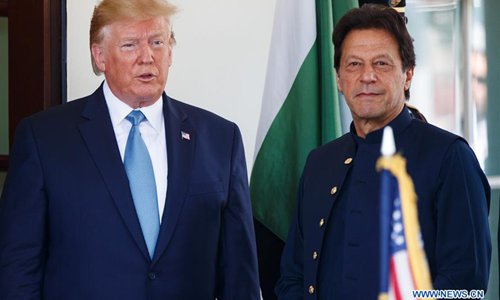HOME >> OPINION
How far can US-Pakistan relations go?
By Zhao Gancheng Source:Global Times Published: 2019/7/25 21:08:40

Photo: Xinhua
Pakistani Prime Minister Imran Khan paid a three-day visit to the US from Sunday to Tuesday at the invitation of US President Donald Trump. US-Pakistan ties have witnessed setbacks in recent years. In early 2018, Washington suspended $1.3 billion economic aid to Islamabad. Then why would Trump invite Khan to Washington? What did they discuss?
Afghanistan topped the agenda of the meeting between Trump and Khan. The US president may desire to seek an advantageous position for the 2020 presidential campaign by ending the war in Afghanistan.
Hence, Trump has to rely on Pakistan. Islamabad has been playing an indispensable role in Washington's interaction with Kabul.
If the US hopes to extend its presence in Afghanistan, it needs Pakistan's cooperation. In 2017, after just taking office, Trump increased the US military presence in Afghanistan by increasing troop numbers in the country to over 15,000. The growing number of troops also involved transporting more logistical equipment for which Pakistan provides the optimal route.
Without Pakistan's help, the US would only be able to access Afghanistan through the Central Asian countries. If that happens, Washington would be hobbled by Moscow, as most of these countries are under the Russian sphere of influence.
Currently, the Trump administration is trying to negotiate with Taliban on pulling troops out of Afghanistan. To end the war in Afghanistan, Pakistan's help is essential. A load of withdrawal work, negotiations with Taliban to secure the stability of Afghanistan need the neighboring country's help. If Islamabad plays spoilsport, Washington would achieve nothing.
US economic aid to Pakistan, an important bargaining chip when negotiating issues on Afghanistan, would have been another important subject to come up for discussion during the visit. In early 2018, Trump tweeted, "The United States has foolishly given Pakistan more than $33 billion in aid over the last 15 years, and they have given us nothing but lies & deceit" and then cut millions of dollars in aid to Islamabad. Pakistan is expecting the US to restore the dole because the South Asian country is struggling with a weak economy.
Ahead of the meeting between the two leaders, Trump said, "All of that money can come back, depending on what we work out." Therefore, if economic assistance is restored, it will signal further cooperation between the two countries to deal with Afghanistan.
Second, since Khan became the prime minister, the US has not had a clear picture about him and his administration. Trump's New South Asia Strategy in August 2017 throws its weight behind India, marginalizing Pakistan. Since Pakistan now has a different prime minister, Trump may hope to redefine and reposition US policy toward the country through the cricketer-turned-premier's visit.
Third, Pakistan is an influential country in the Islamic world and the only Muslim nation to possess a nuclear weapon. Due to worsening ties between Washington and Tehran and Riyadh, Trump may have new notions about its ties with Pakistan. Trump's invitation to Khan may be related to US policy on Islam.
The China-proposed Belt and Road Initiative (BRI) may be another point on the agenda. The US is fully opposed to the China-Pakistan Economic Corridor (CPEC) and regards it as so-called China's expansionist agenda. There are controversies over BRI in Pakistan as well.
Some believe it does not benefit most ordinary people and has saddled Pakistan with huge debts, but the Pakistani government is willing to cooperate with China on the CPEC that is part of BRI.
In summary, Khan's trip to Washington will take ties forward, but it remains to be seen how far relations can advance.
The author is a research fellow at the Shanghai Institute for International Studies. opinion@globaltimes.com.cn
Posted in: ASIAN REVIEW